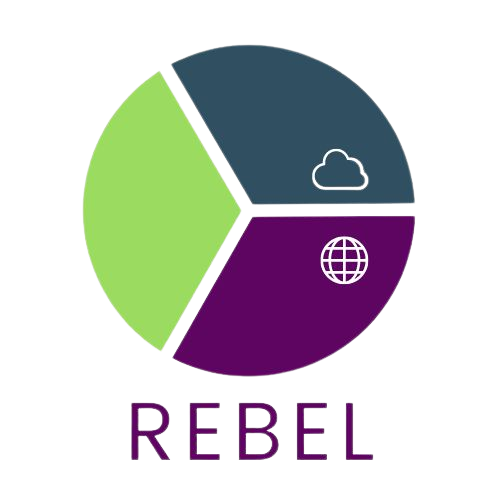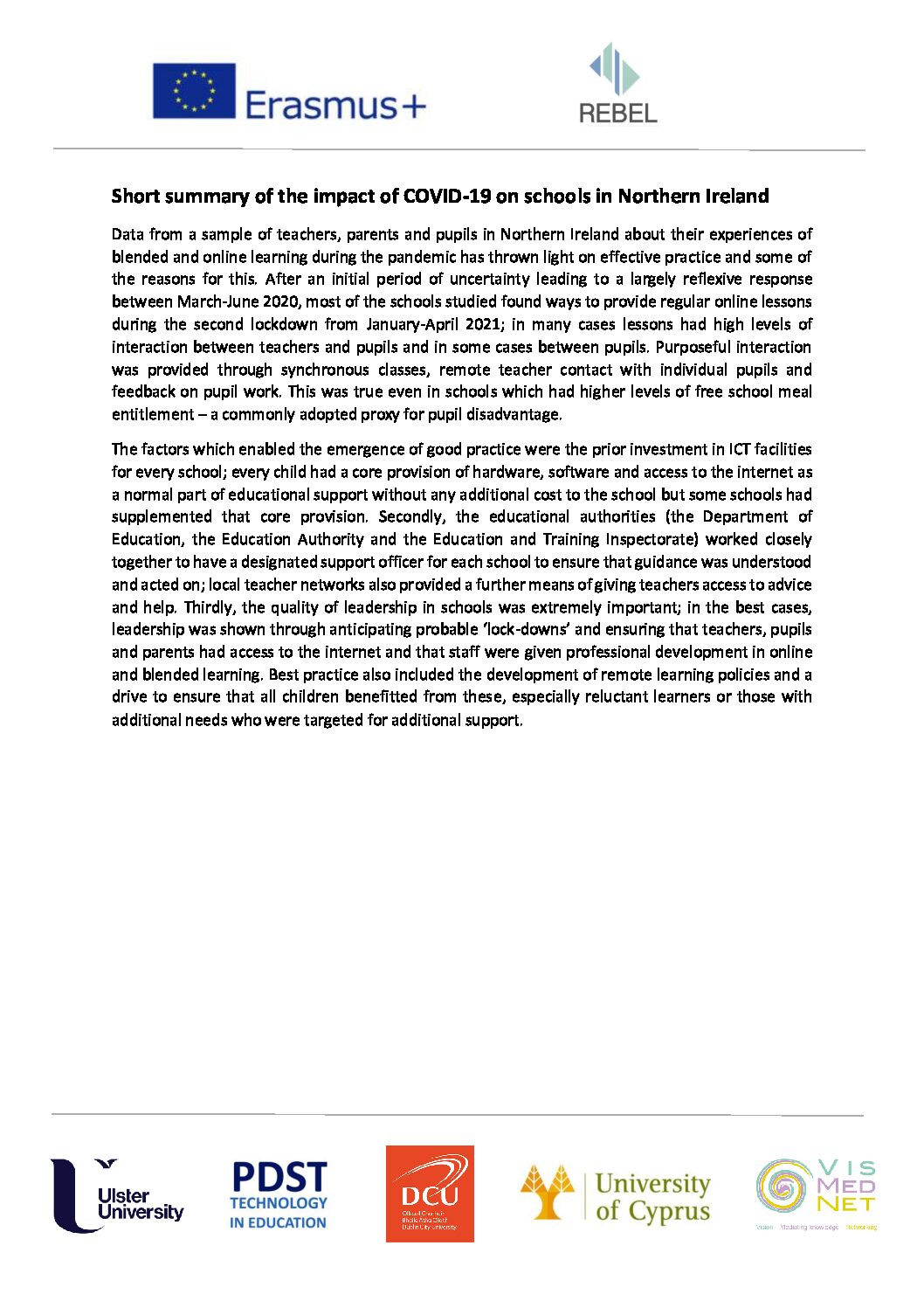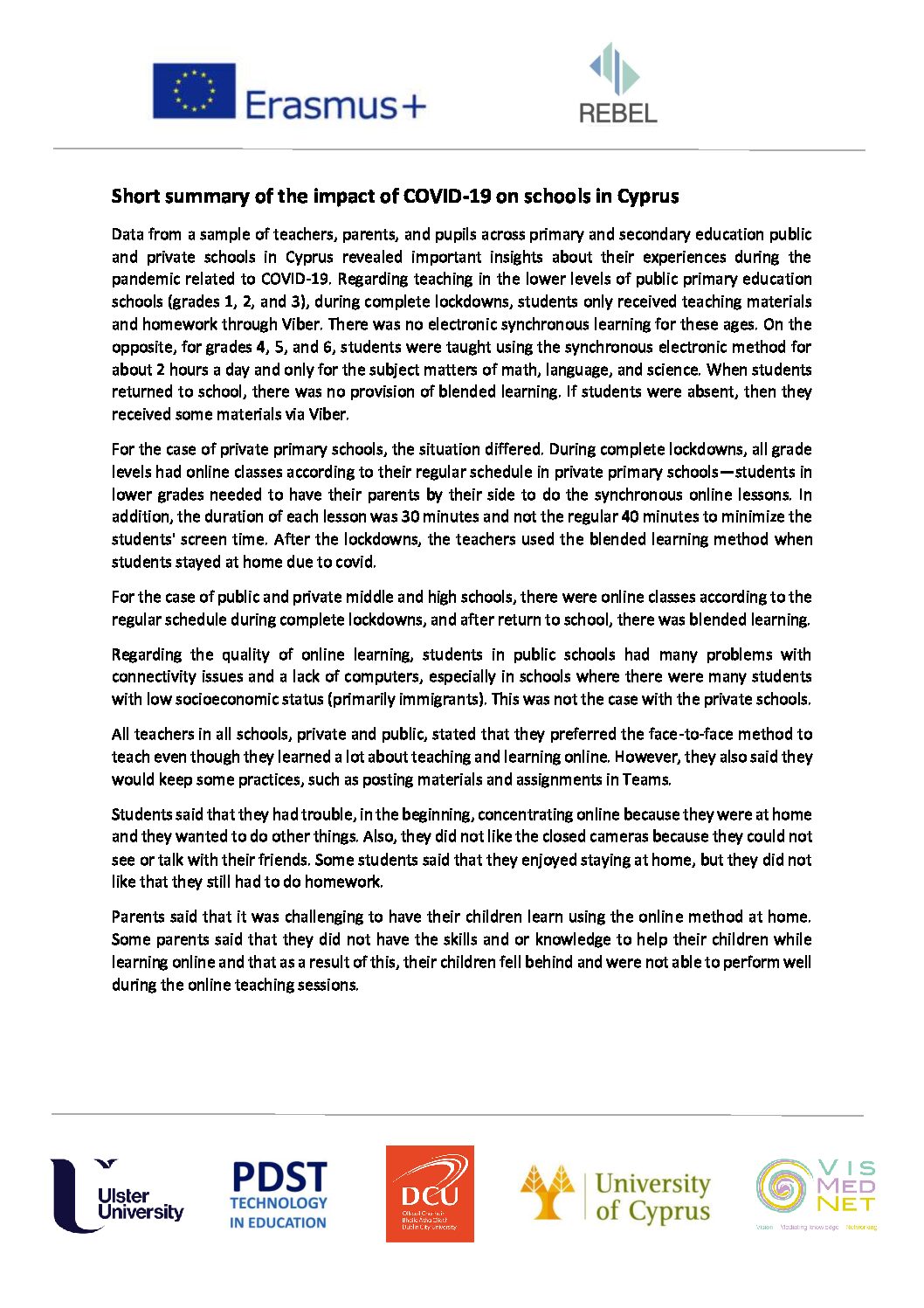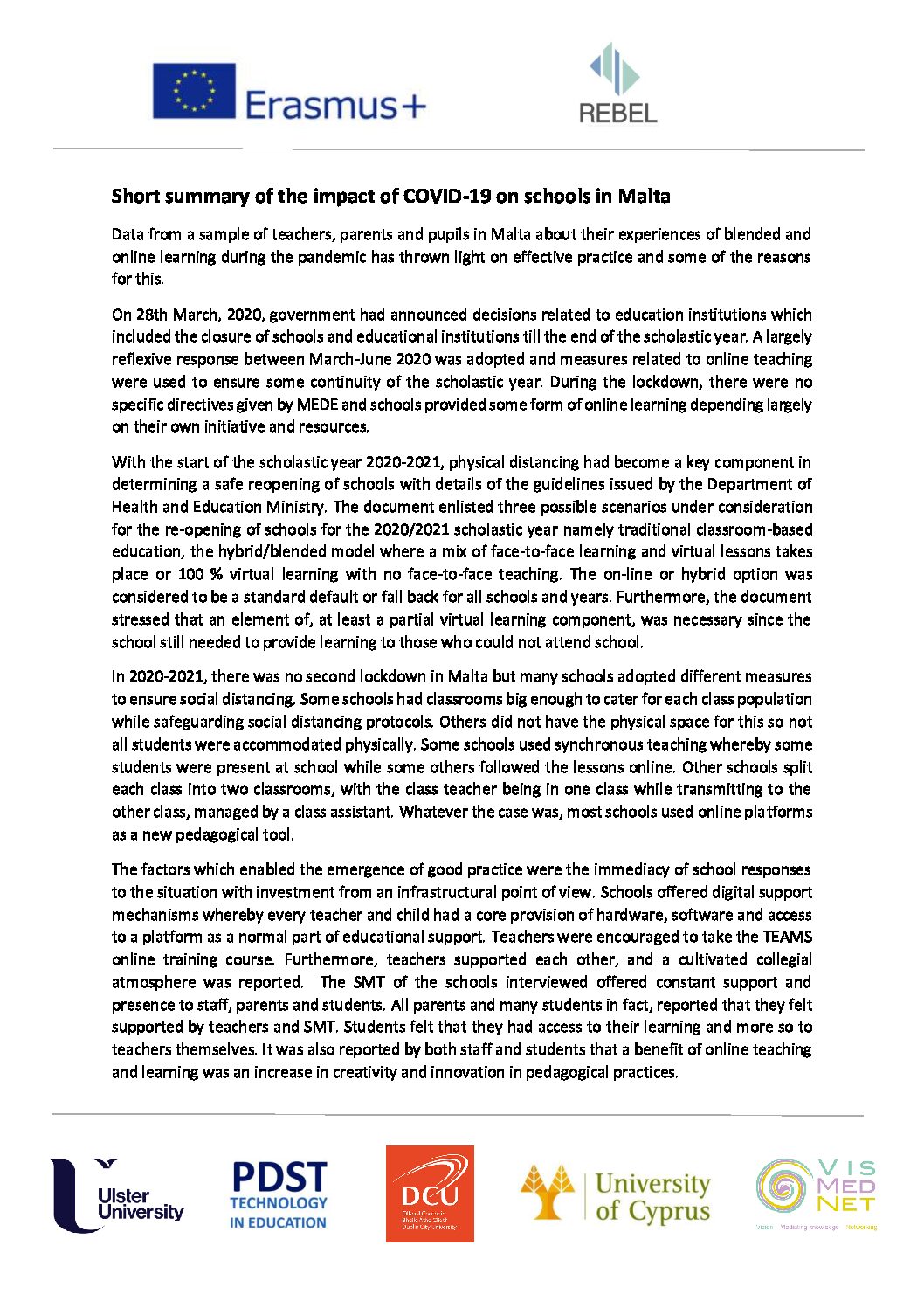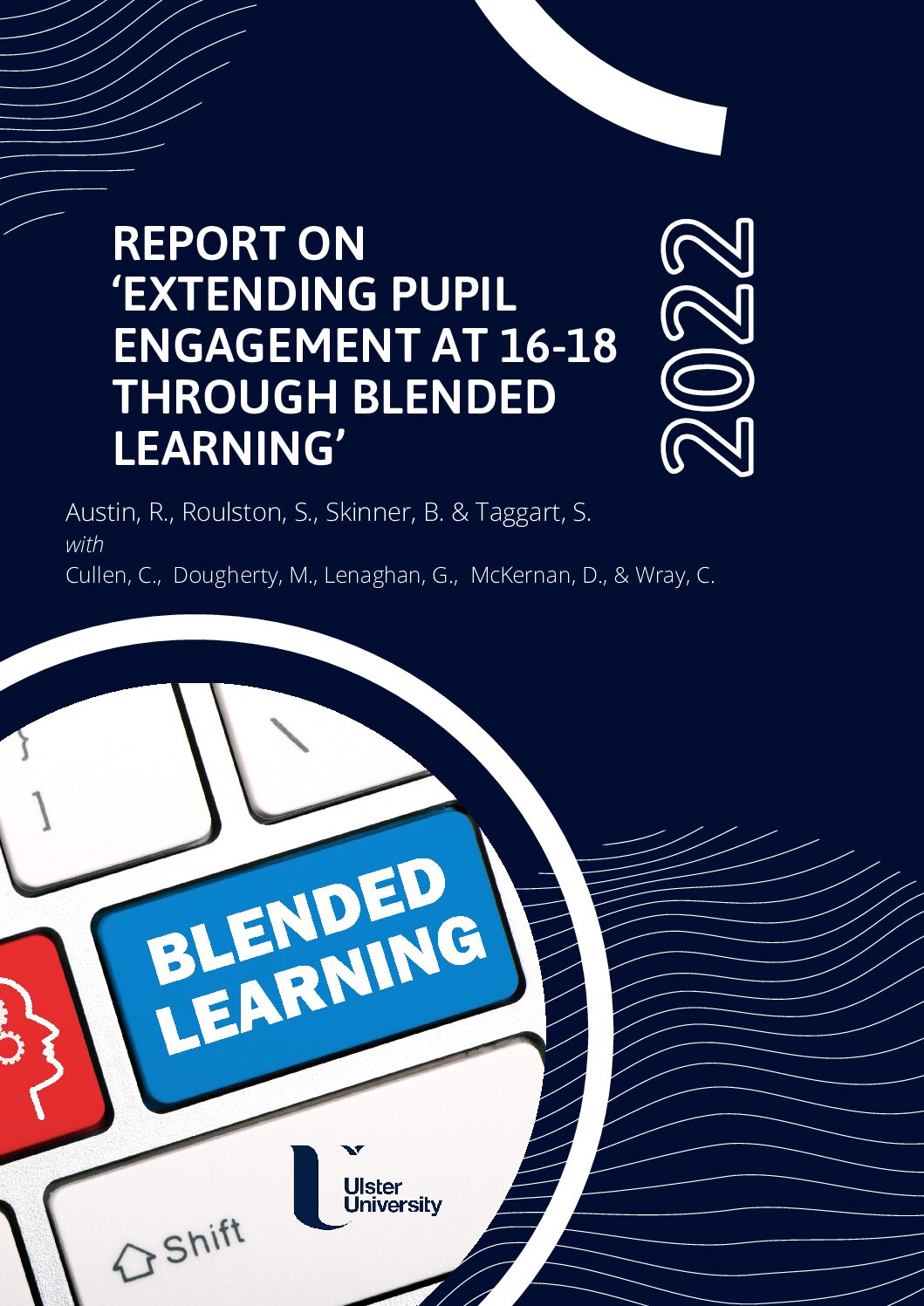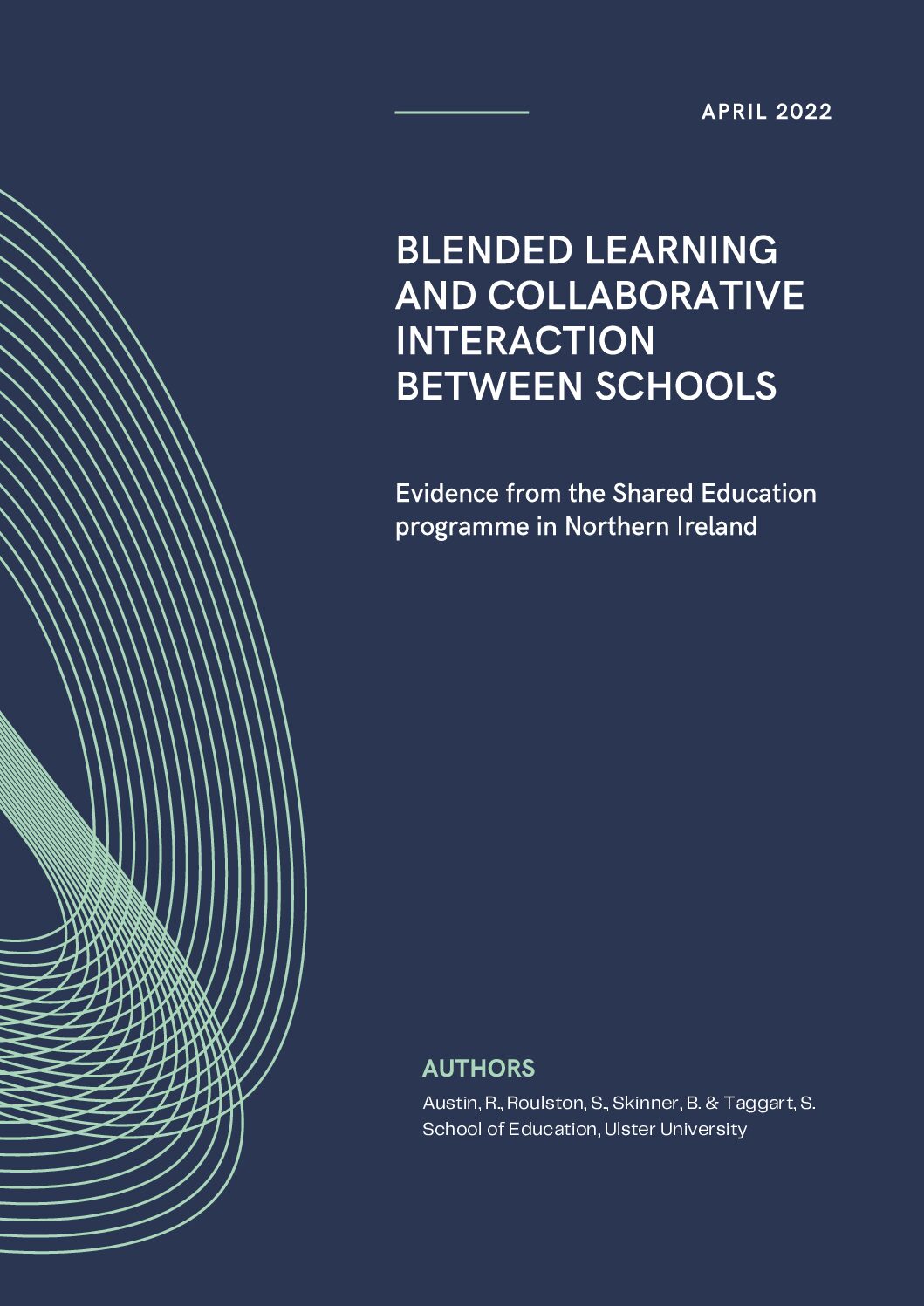O1: Case Study Evaluation (and first publication) on Hindering and Facilitating F(A)ctors related to Blended Teaching and Learning
Led by EQI/DCU who are world-renowned experts in the field of School Evaluation, Case Study Research and Intercultural Studies; in preparation for this Output, a rapid literature review and survey of Hindering and Facilitating F(A)ctors related to remote Teaching and Learning was conducted between March and October 2020.
(Attached to this Annex). What was apparent was that although schools have put in place various mechanisms and supports to enhance either Face to Face (for the entire school) or remote learning (for the entire school) when it comes to the biggest challenge; that of providing a blended (Online and face to face) teaching and learning environment, issues abound.
The purpose of this Case output is to ascertain the Hindering and Facilitating F(A)ctors related to Blended Teaching and Learning (What has now become the only solution to keep schools open across Europe during the covid era)
This multi-modal case study of five schools per country, chosen from a pool of schools across the socio-economic divide will seek to elicit the experiences of all stakeholders( via interviews with Principals, Class teachers, Students, Parents and assessment biography) in relation to leadership, teaching and learning with blended teaching and digital learning ecosystems.
Description
Each partner seeks to enhance the understanding of the Hindering and Facilitating F(A)ctors related to Blended Teaching and Learning in their country/ region through the development of a series of case studies. Dublin City University and PDST/TIE in Ireland; The University of Ulster in Northern Ireland; the University of Cyprus in Cyprus; VisMedNet in Malta. A case study protocol will be developed in each of the project partner’s first language (English, Greek and Maltese). The description of the five cases, as a result of the analysis, will also be translated into the three languages that are part of this project team. This makes our results accessible to countries who do not frequently engage in English-speaking publications and reports. The outcome of the Case Study (together with outputs 1-5) will also be used for the development of the REBEL Training Module, Toolkit and MOOC.
Expected Impact and Transferability Potential
The case studies will inform the project partners thoroughly on the state of affairs in their own educational system and of the other partner countries. The results will enable the identification of specific areas that are of particular interest and in a strong need for support. This will have a particular impact on the development of the REBEL Framework, toolkit, training programme and MOOC. It will also impact a broad range of stakeholders within the field of Blended Teaching and Learning, education studies; for example, policymakers, academics and practitioners. It will also challenge national and transnational support agencies to further consider the challenges and elements of best practice to lead teaching and learning in blended Teaching and Learning school environments.
Executive Summaries
O2: Co-Creation of an Evaluation Framework for Blended Teaching and Learning
This project involves the collaborative creation and development of an Evaluation/Quality Framework that serves as both an internal (Self) and external (Inspection) tool for assessing the quality of Culturally Responsive Blended Teaching and Learning in Schools. To prepare for this project, a raif review was conducted on existing teacher competence frameworks to examine how they incorporate the principles of blended intercultural learning. For reference, the work of Roulston and Hunter (2020) was consulted. The following frameworks were assessed: UNESCO ICT CFT, DigCompEdu, ISTE Standards for Teachers (ISTE-ST) Framework, and iNACOL Blended Learning Teacher Competency Framework.
Expected Impact and Transferability Potential
The REBEL Evaluation Framework is anticipated to be utilised by schools across partner countries to assess the integration of culturally responsive blended learning practices within their educational environment. This framework will be designed as a tool for schools to engage in self-reflection regarding their comprehension and implementation of Blended Learning. The co-creation and construction of the Framework will be informed by insights gathered from the REBEL Case Studies, prior project preparation and planning (as described in Austin and Hunter, 2020, Roulston et al., 2020), as well as a comprehensive evaluation of the practitioner training program’s implementation.
Evaluation framework (English, Greek, Maltese):
| English | Greek | Maltese |
|---|---|---|
O3: Co-Creation and Development of a Toolkit to facilitate Blended Teaching and Learning in Schools
Building upon the findings from Outputs 1 and 2, this particular output focuses on the Co-Creation and Development of a comprehensive Toolkit intended to support and enhance Blended Teaching and Learning practices in schools. Facilitated by PDST TiE, in close collaboration with school personnel and students from the Case Study Schools, the aim is to create and pilot a toolkit that offers detailed guidelines and a range of tools for various stakeholders, including school leaders, school inspectors, support agencies, and teachers, to effectively implement blended learning within the context of intercultural education.
The development process of the toolkit will involve a participatory approach, ensuring the active involvement of relevant stakeholders. School personnel, particularly teachers and leaders, will contribute their expertise and insights, drawing from their experiences and understanding of the interplay between blended learning and intercultural education. Similarly, students from the Case Study Schools will offer their valuable perspectives, providing an essential voice in shaping the toolkit’s content and usability.
The toolkit itself will encompass a comprehensive set of resources and practical strategies to enable schools to navigate the complexities of blended learning. It will provide step-by-step guidance on designing, implementing, and evaluating blended learning initiatives within an intercultural education framework. The aim is to offer practical solutions and innovative approaches that can effectively address the challenges faced by educators and leaders in promoting cultural responsiveness and inclusivity in the blended learning environment.
Elements of Innovation
This output is innovative in not only providing a toolkit for the development of blended learning in schools but doing this in a way that takes account of cultural differences between schools and within schools. Using co-creation as the research development process, it will be the first time that the development of a blended learning toolkit has been created with teachers at the core of the design and piloting process.
By way of explanation, this new concept demands new approaches, new identities and new competencies therefore, a strong and sustainable toolkit ensures its effective implementation.
O4: Practitioner Training Programme to facilitate Blended Teaching and Learning in Schools
The findings from the case study analysis conducted in the REBEL project’s Output 1 (IO1), which examines the factors that hinder or facilitate the development of blended learning, will play a crucial role in shaping Output 4 (IO4), the practitioner training programme. It is important to note that the outcome of the work in IO1 is not predetermined, as it will be carried out from April to October 2021. However, it is expected that the needs of teachers in implementing high-quality culturally-responsive blended learning will be both specific and comprehensive in nature.
The practitioner training programme will be developed based on a shared framework that aims to provide teachers with a solid understanding of blended learning models and equip them with the skills to plan and design its implementation effectively. This framework will incorporate insights derived from best practices, enabling teachers to develop pedagogical plans that consider the social, cognitive, and teacher presence aspects of blended learning.
Throughout the professional development days, teachers will be encouraged to create a 4-6 week action plan to integrate blended learning into one of their classes. This action plan will serve as a practical guide for implementing blended learning strategies and activities in a real classroom setting. By engaging in this hands-on approach, teachers will have the opportunity to apply their learning and explore the potential of blended learning within their specific teaching contexts.
At the end of the designated time frame, teachers will reconvene to share their experiences and insights with other members of their training cohort. This collaborative sharing session will provide an opportunity for teachers to reflect on the successes, challenges, and lessons learned from their implementation of blended learning. By exchanging ideas and perspectives, teachers can benefit from the collective wisdom of their peers, further enhancing their understanding and refining their approaches to blended teaching and learning.
The practitioner training programme acknowledges the individualised nature of teachers’ needs while also fostering a holistic approach. It recognises that teachers require personalised support to effectively implement culturally-responsive blended learning practices. By offering a common framework as a foundation, the programme ensures consistency and coherence in understanding blended learning models and principles, while allowing teachers the flexibility to tailor their implementation plans according to their specific classroom requirements.
Ultimately, the practitioner training programme aims to empower teachers with the knowledge, skills, and confidence to integrate blended learning seamlessly into their instructional practices. By emphasising collaboration and experiential learning, the programme strives to create a supportive and engaging environment for teachers to explore, experiment, and innovate with blended learning strategies.
Description and Target Groups
The practitioner training will be based on a common model designed to familiarise teachers with the tools they need for blended learning and to draw on insights of good practice to develop sound pedagogical plans which take account of social, cognitive and teacher presence. During the professional development days, teachers will be encouraged to draw up a 4-6 week plan of action in their schools to embed blended learning in one of their classes. At the end of that time, teachers will be brought back together to present insights from their experience to other members of their training cohort. This work will be coordinated by trainers in each country and a selection of reports from schools will be made available on the project website. The practitioner events will involve Dublin City University and PDST/TIE in Ireland; The University of Ulster in Northern Ireland; the University of Cyprus in Cyprus;
VisMedNet in Malta.
Activities:

The professional learning course was expertly crafted with the core tenets of culturally responsive teaching and universal design for learning at its heart. Teachers were provided with a six-week, self-directed training course that presented each module in two dynamic formats, encompassing presentations, podcasts, screencasts, and interactive pdfs. To reinforce their learning, teachers were tasked with accompanying assignments that allowed them to practically apply the concepts they had learned.
To support teachers even further, a comprehensive toolkit was also made available, offering additional resources and support to facilitate their understanding and implementation of blended learning. This ensured that educators were equipped with everything they needed to implement their new skills with confidence and success.
To launch the program, a face-to-face event was held, providing teachers with an overview of the course and a chance to meet the advisors offering ongoing support throughout the program. The first three modules were made available to the teachers at the launch event, with the remaining three released following the first check-in call. Online check-ins were provided to support teachers as they integrated blended learning into their classrooms, ensuring that they were confident and supported at every step of the way.
The course culminated in a shared learning event where teachers came together to showcase how they had implemented blended learning into their teaching practice, and the positive impact it had on their students’ learning. This event provided a platform for teachers to exchange ideas and inspire each other, creating a supportive community of educators committed to excellence and innovation in teaching.
O5: Co-Creation and Development of a MOOC (for Blended Teaching and Learning in Schools)
As part of the project’s initiatives, a Massive Open Online Course (MOOC) will be developed, specifically tailored to the needs of individuals who have not received training or are not directly involved in the day-to-day operations of school life, such as parents and management bodies. The MOOC aims to provide guidance and support on implementing culturally responsive blended learning strategies in schools and organisations.
The development of the MOOC will involve the active participation of all project partners, who will collaboratively contribute to the creation of storyboard content. Additionally, the University of Cyprus (UCY) will play a key role in designing and developing the technical plugins required for the MOOC, ensuring its smooth functionality. Feedback and input from all partners will be sought throughout the development process to ensure the MOOC meets the needs and expectations of its intended audience.
This output represents a highly innovative approach, leveraging cutting-edge information and communication technologies (ICT) to disseminate project materials in an interactive manner to specific target audiences. By embracing the latest digital possibilities, the MOOC will provide an engaging and accessible platform for participants to enhance their understanding and implementation of blended learning strategies. It offers a remote access option that eliminates the need for extensive travel, benefiting participants across different regions and countries.
The MOOC’s design will prioritise user-friendliness and accessibility, ensuring that participants can easily navigate through the course materials and engage with interactive content. Through a combination of videos, quizzes, discussion forums, and other multimedia elements, the MOOC will offer a dynamic and immersive learning experience. Participants will have the opportunity to learn at their own pace, accessing the course materials at their convenience.
Elements of Innovation
This highly innovative output, through the usage of state-of-the-art ICT technologies, explores the newest digital possibilities to disseminate the developed materials in an interactive way with the predefined audiences. Schools will benefit from this remote access technology to build their blended learning capacity. The MOOC will also ensure high accessibility in all participating countries and will avoid long-distance travel for training events. The findings of the pilot study of the innovative MOOC will feed into the refinement of the MOOC to facilitate the distributed evaluation and planning in schools. The newly developed MOOC will be tested for the first time in different project countries.
